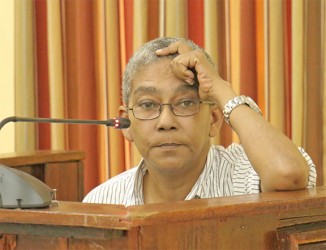When a bloodied Donald Rodney came to her house after the bomb blast that killed his brother Walter Rodney on June 13, 1980, he was in shock, human rights activist Karen de Souza testified yesterday.
Resuming her testimony before the Commission of Inquiry (CoI) into Rodney’s death yesterday to complete her evidence, de Souza said she subsequently visited the scene of the blast then returned home and cleaned Donald Rodney’s wounds before WPA members came and took him away.
Even though PNCR attorney Basil Williams sought to probe why she never inquired from Donald Rodney what had happened, even though he was covered in blood and she had visited the area where Dr. Walter Rodney died, she maintained that she was in shock.

The CoI had been set up to probe the circumstances surrounding the June 13, 1980 death of Dr. Rodney, a WPA co-leader. Donald Rodney is his brother and the two were together when a walkie-talkie given to them exploded, killing Dr. Rodney.
Williams kept pounding at what he described as inconsistencies and contradictions but de Souza held her ground. She denied a suggestion that she did not inquire what had happened because she was already aware of what Dr. Rodney’s activities were on the day that he died.
Shortly after the explosion, de Souza had previously said, Donald came to her and said that there had been a terrible accident.
Under cross-examination by Keith Scotland, the attorney representing Donald at the hearings, de Souza said that when Donald came to her, his face and arm were bloody. She said that she understood him to be telling her that something catastrophic had happened and “not that they were playing with fire and they had gotten burnt.”
She said that when she subsequently visited the scene, the police were already there but the area wasn’t cordoned off. She said that Dr. Rodney’s body was still in the car and when she left it was still there with no one tending to it.
From her recollection, she stayed between three to five minutes and during that time she did not recognise any ambulance or paramedics on the scene or anyone going up to the car to look at the body.
She said that members of the death squad were just standing around. She later said that she knew the faces of the death squad members but only knew one of them by name.
de Souza explained that when she returned home, she tended to Donald, who was still there. When she left him to go to the scene, she said he was alone and standing at the top of the stairs. When she returned, he was still standing at the top of the stairs. “I tried to stop some of the bleeding… I can’t remember how long I tended to him,” she said, adding that Donald was bleeding both from his face and from his arm. She said that she saw small injuries on his arm. She could not remember the injuries on his face.
She said that after she had tended to him, a couple of friends from WPA came and collected him. “I don’t know where they took him but I imagine they took him for medical attention,” she said adding that it was not long after she returned home that Donald was taken away.
Meanwhile, responding to questions from Williams, de Souza said that she did not question Donald about what had happened.
She said that when she returned home, she did not mentally link him to the explosion. She pointed out that when Donald arrived he was “in a state” and at the time she didn’t think she had to inquire from him what had happened.
“I did not inquire. I did not address my mind to inquiring. I was in shock. Donald was in shock,” she said.
Williams made the point that even though she was in shock, she went to the scene, spent some time there and then returned home and cleaned Donald’s wounds but still did not inquire about what had occurred.
Asked if she agreed that if such an event occurred that the normal thing would have been for Donald to remain on the scene until police arrived, de Souza said that the police were not friends of the WPA. “Why would he remain there?”
According to de Souza, Donald was not a member of the WPA and was not involved in WPA meetings.
Meanwhile, de Souza also opined that the Ministry of National Development was an important element of the PNC and its burning down may have shocked the government of the day. This was in response to questions posed by attorney Selwyn Pieters, who is looking into the interest of the Guyana Trades Union Congress (GTUC). She said too that she had no direct evidence that WPA members were acquiring arms.
She also said too that she had met Robert Gates as he was the bodyguard of Dr. Rupert Roopnaraine. According to her, at that time she did not know that he was a member of the Police Force.
Responding to questions posed by lawyer for the Rodney family Andrew Pilgrim, de Souza said many persons learnt that association with the party had serious consequences, which included the loss of their jobs or transfers and police harassment. She said that she knew two persons who were transferred because of their association with the WPA.
One was Bonita Harris, one of the leaders of the WPA who was transferred to a school in the interior. She said that she is also aware of police officers who were removed because they were considered to be too friendly or polite to the WPA.
de Souza, later answering questions posed by Christopher Ram who is the attorney for the WPA, said that she was not appearing as a WPA witness but rather her presence was based on the fact that she had given evidence at the inquest.




